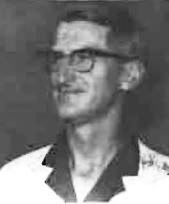DOCTOR OF PHILOSOPHY (HONORIS CAUSA)
 Dale du Toit was born at De Aar and received his school education in Middleburg, Cape, and at the Grey High School, Port Elizabeth. In 1950 he obtained the degrees MBChB at the University of Cape Town.
Dale du Toit was born at De Aar and received his school education in Middleburg, Cape, and at the Grey High School, Port Elizabeth. In 1950 he obtained the degrees MBChB at the University of Cape Town.
Dr Du Toit immediately thereafter joined the staff at the Morgenster Hospital in what was then Southern Rhodesia. He is still there and for the past decade has been Head of the Medical Mission in Mashonaland. He is also Superintendent of Morgenster Hospital, Head of the Nursing School there, and at times the only medical officer on the staff.
The fact that Dr Du Toit chose to render a medical service to a primitive community in a remote region did not for him constitute a withdrawal from the challenges of modern practice but rather afforded him the opportunity to develop the pattern of services initiated by his predecessors, building it up until today it is recognised internationally as the model for medical services in developing countries.
This pattern for rendering medical services involves, in the first place, the intensive training of the local tribesmen so that they can do much of the simpler medical work themselves, thereby relieving the few doctors of up to 80 per cent of their workload. Today "barefoot doctors" are encountered throughout the world, but it was at Morgenster that the primitive person's capabilities were first recognised.
Secondly, an out-clinic system has been developed whereby the trained staff in the remote tribal areas undertake both diagnostic and therapeutic work at clinics, thus extending the central hospital's services to tribesmen who would otherwise be reached infrequently, another system today enjoying world-wide acceptance.
Thirdly, a system of family care for patients in the hospital has also been established by Dr Du Toit and his predecessors. The catering for each patient is undertaken by members of his family who are accommodated in temporary quarters close to the hospital.
Apart from the administration of these services, Dr Du Tait himself gives attention to the daily care of a large number of outpatients, operation sessions, an eye clinic, visits to the out-clinics, daily lectures at the Nursing School, research and a clinic for the staff, as well as to the daily propagation of the Gospel. The State Medical Services of the whole of the southern part of Rhodesia have recently also been placed under his care.
The Morgenster Hospital and Dr Du Toit himself are held in high esteem in Rhodesia, and the government of that country hs honoured him with their highest civilian award. Apart from this personal recognition, however, there are two further factors which will ensure that Dr Du Tait's name and his work will endure: In the first place the services developed at Morgenster have been adapted to the prevailing conditions and are not dependent on any single person. This means that, although the work is currently being threatened by terrorist activities it will remain a ray of light in Africa. And, secondly, it is not only in Africa that the Morgenster system is being followed up, but particularly in Asia and even in a developed country like Iran, medical services in remote areas are being modelled on the Morgenster pattern.
As a Christian, physician, surgeon, administrator, lecturer, preacher of the Gospel and researcher, Dr Du Toit has therefore won a unique place in the international world of medicine, as well as in the hearts of people throughout Southern Africa.
The Council and the Senate of the University of Port Elizabeth regard it as a privilege to honour Dr Du Toit in this way.